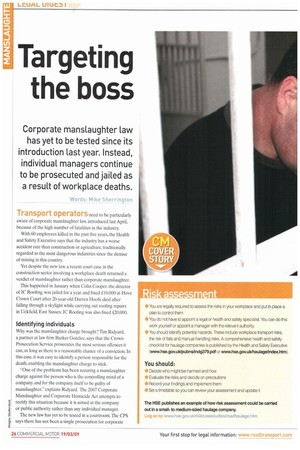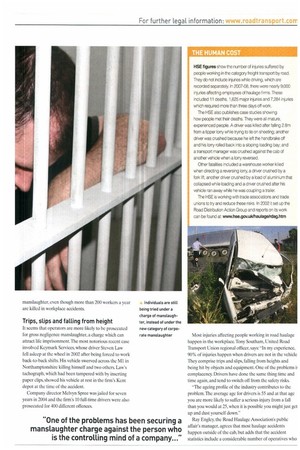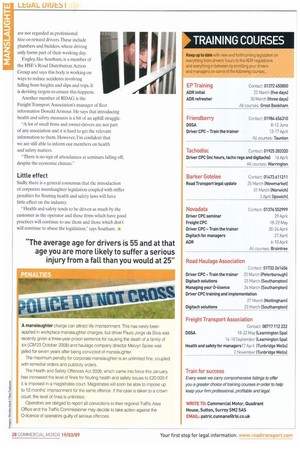Targeting the boss
Page 26

Page 27

Page 28

If you've noticed an error in this article please click here to report it so we can fix it.
Corporate manslaughter law has yet to be tested since its introduction last year. Instead, individual managers continue to be prosecuted and jailed as a result of workplace deaths. Aiorcts: Mike Sherrington Transport operators need to be particularly aware of corporate manslaughter law, introduced last April, because of the high number of fatalities in the industry.
With 60 employees killed in the past five years, the Health and Safety Executive says that the industry has a worse accident rate than construction or agriculture, traditionally regarded as the most dangerous industries since the demise of mining in this country.
Yet despite the new law, a recent court case in the construction sector involving a workplace death returned a verdict of manslaughter rather than corporate manslaughter.
This happened in January when Colin Cooper, the director of IC Roofing, was jailed for a year and fined £1 0,000 at Hove Crown Court after 20-year-old Darren Hoofe died after falling through a skylight while carrying out roofing repairs in Uckficld. East Sussex. IC Roofing was also fined £20,000.
Identifying individuals Why was the manslaughter charge brought? Tim Ridyard, a partner at law firm Barker Gotelee, says that the Crown Prosecution Service prosecutes the most serious offences it can, as long as there is a reasonable chance of a conviction. In this case, it was easy to identify a person responsible for the death, enabling the manslaughter charge to stick.
"One of the problems has been securing a manslaughter charge against the person who is the controlling mind of a company and for the company itself to be guilty of manslaughter," explains Ridyard. The 2007 Corporate Manslaughter and Corporate Homicide Act attempts to rectify this situation because it is aimed at the company or public authority rather than any individual manager.
The new law has yet to be tested in a courtroom. The CPS says there has not been a single prosecution for corporate manslaughter, even though more than 200 workers a year • Individuals are stia are killed in workplace accidents. being tried under a Trips, slips and falling from height ter, instead of under the It seems that operators are more likely to be prosecuted new category of corpo for gross negligence manslaughter, a charge which can rate manslaughter attract life imprisonment. The most notorious recent case involved Keymark Services, whose driver Steven Law fell asleep at the wheel in 2002 after being forced to work back-to-back shifts. His vehicle swerved across the M1 in Northamptonshire killing himself and two others. Law's tachograph, which had been tampered with by inserting paper clips, showed his vehicle at rest in the firm's Kent depot at the time of the accident.
Company director Melvyn Spree was jailed for seven years in 2004 and the firm's 10 full-time drivers were also prosecuted for 400 different offences. Most injuries affecting people working in road haulage happen in the workplace. Tony Southam, United Road Transport Union regional officer, says: "In my experience, 90% of injuries happen when drivers are not in the vehicle They comprise trips and slips, falling from heights and being hit by objects and equipment. One of the problems complac,ency. Drivers have done the same thing time and time again, and tend to switch off from the safety risks.
The ageing profile of the industry contributes to the problem. The average age for drivers is 55 and at that age you are more likely to suffer a serious injury from a fall than you would at 25, when it is possible you might just get up and dust yourself down."
Ray Engley, the Road Haulage Association's public affair's manager, agrees that most haulage accidents happen outside of the cab, but adds that the accident statistics include a considerable number of operatives who are not regarded as professional hire-or-reward drivers. These include plumbers and builders, where driving only forms part of their working day.
Engley, like Southam, is a member of the HSF's Road Distribution Action Group and says this body is working on ways to reduce accidents involving falling from heights and slips and trips. It is devising targets to ensure this happens.
Another member of RDAG is the Freight Transport Association's manager of fleet information Donald Armour. He says that introducing health and safety measures is a bit of an uphill struggle.
"A lot of small firms and owner-drivers are not part of any association and it is hard to get the relevant information to them. However, I'm conl ident that we are still able to inform our members on health and safety matters.
"There is no sign of attendances at seminars falling off, despite the economic climate."
Little effect Sadly, there is a general consensus that the introduction of corporate manslaughter legislation coupled with stiffer penalties for flouting health and safety laws will have little effect on the industry, "Health and safety tends to be driven as much by the customer as the operator and those firms which have good practices will continue to use them and those which don't will continue to abuse the legislation," says Southam.
















































































































































